|
Today we celebrate the feast of St. Augustine, a Doctor of the Church and one of the most important theological writers of the 4th and 5th century. Many of us have either studied Augustine or at least heard some of his more famous quotes. One in particular is quite striking: “Our heart is restless until it rests in you.” These words are taken from one of Augustine’s most well known writings, the Confessions, in which Augustine discusses his long journey towards Christ and his conversion to Christianity.
“Our heart is restless until it rests in you.” These are powerful words. They direct us toward Christ in a simple way that speaks to everyone, for everyone has a restless heart. Pope Francis tells us that Augustine is speaking of three types of restlessness: “the restlessness of spiritual seeking, the restlessness of the encounter with God, the restlessness of love.” This restlessness, whether we recognize it or not, is a desire to know God and to have a deeper relationship with Him. None of this is easy, but God is always there for us. He is waiting with open arms, just as he waited for Augustine in his conversion to Christianity, so that we might rest in Him. Of course, the natural question to ask is how we can rest in the Lord. Augustine gives us a clear answer in his Confessions. He says: “No one knows what he himself is made of, except his own spirit within him, yet there is still some part of him which remains hidden even from his own spirit; but you, Lord, know everything about a human being because you have made him… Let me, then, confess what I know about myself, and confess too what I do not know, because what I know of myself I know only because you shed light on me, and what I do not know I shall remain ignorant about until my darkness becomes like bright noon before your face.” Augustine is giving us an important model of faith to follow, one of deep personal reflection, one that teaches us how to reflect and why we should reflect. Why? Because in reflection, we find God, in reflection, we find rest. But Augustine is very clear about how reflection works. He says, “What I know of myself I know only because you shed light on me.” Reflection is not solitary; we have to reflect with God. It is a prayer. We have all been told time and time again that prayer is an integral aspect of our everyday lives, but prayer does not have to be formulaic, it does not always have to be recited from the back of a card. These types of prayers are amazing and so helpful in directing our lives, but some of the most beautiful prayer is when we reflect with God, when we open up ourselves to Him and just talk to Him and listen to Him in our hearts. Who better to show us the importance of reflection than our Mother? Luke 2:19 tells us “And Mary kept all these things, reflecting on them in her heart.” Mary, the Mother of God, born without sin, who through her body brought Jesus into this world, still took the time to reflect with the Lord. Augustine and Mary are both powerful examples to us. They were holy people, but they were human. They faced struggles in their lives and in their faith. Their hearts were restless in their journeys toward the Lord. But through their example, through their lives, through personal reflection with the Lord, they show us how to find rest in Him. Nicholas Shields is a current District Deputy for the Washington, D.C. Knights of Columbus and a recent graduate of The Catholic University of America.
1 Comment
Last year on the feast day of Saint Monica, I wrote a blog entry about my affinity for the saint with whom I share a name. I wrote about her strength; her persistence in the conversion of her son, Saint Augustine; and her graceful way of dealing with her pagan husband.
I wrote all of this last year knowing that I, myself, was about to be a mother. A month before the feast of Saint Monica, my husband and I found out that I was expecting our first child, due to arrive in April of 2014. It was too early in my pregnancy for anyone to really know about it yet, so as I wrote last year’s blog entry, I was inspired by the example of Saint Monica for what I was about to embark on in a few months. On the actual feast day of Saint Monica last year, my husband and I were able to see our precious baby for the first time by sonogram. As I looked at my child, who appeared to be shaped like a gummy bear, I said a quick prayer to Saint Monica for guidance and protection over the two of us during my pregnancy. Fast-forward about nine months, and our beautiful Anna Ryan arrived bringing such joy and sweetness to our lives and to the lives of our family, friends, and strangers. I am so grateful for the opportunity to be her mother and to watch her grow from that little gummy bear-shaped fetus to a healthy, happy four-month-old, who, while I write this blog, is looking up at me in her dinosaur pajamas, smiling her giant, toothless grin. As I start to navigate this whole motherhood thing, I can’t help but think of Saint Monica or the Blessed Mother or Saint Anne or the myriad of mothers in our Church. As Catholics, we are lucky to have the saints as guides for how to live our lives – as mothers, fathers, priests, religious, workers, travelers, students, teachers, artists, lawyers, and doctors. Most of these holy women and men were just like us – flawed and imperfect – but, through their faith in Christ, were able to do extraordinary things with their lives. We are fortunate to be able to rely on these people in prayer to help us assemble our lives and our journeys of faith. For me, I rely on the model set by the saint who we will celebrate tomorrow. As the patron of married women and mothers, Saint Monica is one of my guides for sorting out this new path I am on as a wife and a mother. I pray that I will have her strength, persistence, and grace not only during the challenging times, but also in the happy, sweet moments I share with my family. Monica Thom Konschnik is the Administration & Finance Manager for the Catholic Apostolate Center and the Administrator for the Pallottine Seminary at Green Hill. “In the world there is often a lack of joy. We are not called to accomplish epic feats or to proclaim high-sounding words, but to give witness to the joy that arises from the certainty of knowing we are loved, from the confidence that we are saved”
(Rejoice! (Letter in Preparation for the Year of Consecrated Life), n. 3) Last month, on the feast day of St. Ignatius of Loyola, Pope Francis went for lunch at the Generalate of the Jesuits. As I reviewed the pictures from his visit, joy and happiness are very evident. He appears very comfortable and relaxed with them, even though he may not know them well individually. Why is he comfortable? As a member of a religious community, I think that I can venture an answer. He is among those who shared a similar formation as he did as a member of the Society of Jesus. Technically, he formally ended his time as a Jesuit when he became a bishop. Bishops cannot be under the authority of the superior of a religious community. They can, though, ask to continue to use the religious initials of their community as well as wear the habit. Cardinal O’Malley, the Archbishop of Boston, continues to use the initials of the religious community that he came from, the Capuchin Franciscans, as well as wear the habit. Many religious communities even officially continue to count bishops among their membership. Some might think this strange, but the reality is that once a person is part of a religious community, it is part of who that person is and how the person approaches God, life, ministry. When you share a common formation and lifestyle from a relatively young age, that formation does not simply go away. It is a lifestyle that one freely chooses and it forms and informs the person. Once committed to, consecrated life (cf. Catechism of the Catholic Church, n. 913-933) is not something that can easily be cast aside. Even those who have left religious communities often continue to live the spirituality of that community as a single or married person or diocesan priest. I have seen it time and time again. Twenty-eight years ago today, I made my First Consecration of Promises as a member of the Society of the Catholic Apostolate (Pallottine Fathers and Brothers). Our six promises of poverty, chastity, obedience, sharing of resources, spirit of service, and perseverance have provided me with a way, within the context of our community life, to live the charity of Christ. I make no claim to live it perfectly, but I try to live it as authentically as possible. The way that I live more authentically is through the assistance of the members of my community who “urge me on” to live more fully in Christ’s love. This summer, more than most, I have had to even more deeply reflect on the quality of my life as a member of the Society. Am I living as an apostle, as St. Vincent Pallotti called all to do, reviving faith and rekindling charity? Have I fully surrendered, given, and offered myself to God, as the form of consecration of my religious community challenges me to do? If not, then why not? These questions have been very much on my mind as I form, with the help of God, a new member of the Society who began Postulancy only a few days ago. Thirty years ago last month, I did the same and have grown and developed spiritually and otherwise in ways that I would have never thought or imagined. As I work in formation with our Postulant, Brandon, I try to teach, but once again God causes me to learn and for that I am full of gratitude and joy. Pray for those in consecrated life, especially as the Church prepares for the Year of Consecrated Life that will begin this coming Advent! Fr. Frank Donio, S.A.C., is Director of the Catholic Apostolate Center and teaches for Saint Joseph’s College Online. This blog post was first published on August 17th on the St. Joseph’s College of Maine Theology Faculty Blog. Click here to learn more about our cooperative alliance with St. Joseph’s College Online Humanity can sometimes let us down. This is a lesson I have learned in the past few years in dealing with some troubling times in my family. People are often untrustworthy, imperfect, and make mistakes, and this is true even in the closest of families. Each one of us carry bruises and pain from times when we have been let down by our neighbors, family, and those we’ve trusted. The weight of sin can be too much for some of us, and it pulls us deeper and deeper away from hope. That is where trust in God comes into the picture. When the world burdens us with failures, broken promises, and sadness, Christ is there to pick us up with strength, promises of eternity, and joy in the Lord! Psalm 25: 4-7 reminds us that we need to trust in the Lord’s goodness and forgiveness to guide the life journeys we’re on:
“Show me your ways, Lord, teach me your paths. Guide me in your truth and teach me, for you are God my Savior, and my hope is in you all day long. Remember, Lord, your great mercy and love, for they are from of old. Do not remember the sins of my youth and my rebellious ways; according to your love remember me, for you, Lord, are good.” Throughout the Bible, we see God’s promise of hope and forgiveness. Learning from his example, it is our job to imitate the Lord’s forgiveness with those who have wronged us, and accept forgiveness in return. When Peter asked Jesus in Matt 18: 21-22, “Lord, how often shall my brother sin against me and I forgive him? Up to seven times?,” what was the response? “Seventy times seven” (….or more of course). We must strive to imitate this forgiveness in our everyday lives, too. Forgiveness is necessary for cleansing our hearts, but Jesus calls us one step further yet: to love as he loves. It can be very simple to love or it can be very difficult, the choice is our own. During some of the most difficult years with my family, I knew that I had a decision to make. I could either harbor resentment towards those who hurt me, or I could try to forgive them and love them in whatever way I possibly can. Today, I still can become irritated when tensions rise, but I’m trying to look at the situation through a lens of love. Even if it breaks your heart, even if all efforts seems lost, by showing love to your neighbors and forgiving transgressions, you are imitating Christ whether you realize it or not. Strive for that same goodness and righteousness with which Christ instructed his disciples: as I have loved you, so you must love one another. Go out and do the same! Krissy Kirby is a recent graduate of The Catholic University of America in Washington D.C., and will soon be teaching Kindergarten in the Archdiocese of Washington. 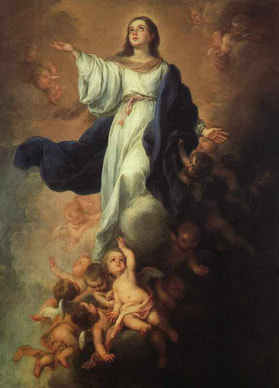 On November 1, 1950, Pope Pius XII issued the Apostolic Constitution Munificentissimus Deus (The Most Bountiful God) which declared “the Immaculate Mother of God, the ever Virgin Mary, having completed the course of her earthly life, was assumed body and soul into heavenly glory.” In doing so, Pope Pius defined for all time that the Assumption is a belief of the Catholic faith (cf. CCC, 966). And though the decree itself is only sixty-four years old, it succinctly shows that the belief spans all the way back to the beginnings of the Christian tradition. But what are the implication of this teaching and its feast day for the everyday faithful? First of all, it further illustrates Mary’s importance not only for Catholics but also for all mankind. This feast is but another way in which the Church honors the vessel that brought the Messiah into the world. It is through Mary that the human race received its savior. Therefore, one can see her Assumption into Heaven as a beautiful gift given to her by God. After living a truly exemplary life of faithfulness and love, God saw fit to bring her body and soul into paradise where, as PopePius puts it, “as Queen, she sits in splendor at the right hand of her Son, the immortal King of the Ages.” The Virgin’s Assumption, however, is also a gift to the faithful.The Holy Father writes, “while the illusory teachings of materialism and the corruption of morals…threaten to extinguish the light of virtue and to ruin the lives of men by exciting discord among them, in this magnificent way all may see clearly to what a lofty goal our bodies and souls are destined.” Mary was the first disciple of Jesus; she was the perfect disciple of Jesus. At the Wedding at Cana, she tells the servers, “Do whatever He tells you.” This is the same kind of trust all the faithful should try and emulate. And, after living a model life, she was gifted with her body and soul being brought up to Heaven. That is exactly the same hope that all Catholics (should) share. The Nicene Creed sums it up quite well: “He will come again in glory to judge the living and the dead and his kingdom will have no end…I look forward to the resurrection of the dead and the life of the world to come.” Catholics believe that at the end of time itself, when Christ comes to “render to each man according to his works, and according to his acceptance or refusal of grace,” all the dead will be resurrected (cf. CCC, 682). Those who enter Heaven will be restored, body and soul, to the gloried beings they were always meant to be before the Fall. Thus, the Assumption of Mary is not just a one-time occurrence, but rather a foretaste of what will happen at the end of days. It was not only a gift to the Blessed Mother, but also a gift to mankind. Humanity received a glimpse into what lies ahead for those who follow the example of a woman who put her whole heart, her whole faith, and her whole being into the care of a man she knew as her son and the Son of God. Victor David is a Collaborator with the Catholic Apostolate Center and is a staff member at The Catholic University of America, his alma mater, in Washington, D.C. He is a member of the Catholic University Knights of Columbus. From the very beginning of my schooling, I can remember the constant encouragement of my family to do better – to strive for the highest goals. I’m sure we can all remember being lectured about the importance of getting good grades, reading at a higher level, the absolute necessity in life for multiplication tables, etc. This led to being told how important it is to go to college, to do well in school, to graduate with a high GPA – with honors – magna-summa cum laude – I’m sure many of us have heard all this before, or are hearing it right now. These achievements are indeed important – they lead to us getting good jobs or moving on to higher learning. Without these accolades it would be difficult for us to achieve our goals.
Today, many of us are in an environment where we feel like we need to constantly achieve more – to gain notoriety, a high social status, or a promotion at work. While it’s always fine to strive for something, it is important to remember that it’s not all about being noticed – or being the best. There is so much more to life than trying to get to the top of the heap. In today’s Gospel, the disciples asked Jesus, “Who is the greatest in the Kingdom of Heaven?” (MT 18:1) Jesus presents the disciples with a child, instructing them that unless they become like the children, they will never enter the Kingdom. Jesus furthermore says, “Whoever humbles himself like this child is the greatest in the kingdom of heaven.” (MT 18:4) We are tasked to remember that being humble is an essential part of life. We shouldn’t be boastful or prideful when we succeed, we should be grateful for the opportunity to make a difference and help others. We should take a cue from our Holy Father, who has made the choice to actively be as humble as he can in word, deed, and action – even though it is not required of him. When we can, we should always choose to be humble, to allow others to go before ourselves, and to remember that if we want to enter the Kingdom we should think back to our childhood – where we were always looking up and not looking down. Chris Pierno is the Media & Marketing Manager for the Catholic Apostolate Center A couple of weeks ago, I traveled to my hometown in Wisconsin to surprise my mother on her birthday. My father had been cooking up a giant surprise party for her, and I was going to be the first part of that surprise. I spent this whirlwind weekend almost exclusively with my family…both immediate and extended. My mother’s side of the family is what is often described as the “stereotypical Irish Catholic family.” My grandparents met in college, married and had 9 children. I have over 40 first cousins and many of us live within a mile of my grandparents’ house. Growing up in this family was a unique experience and one which I realize now has shaped me more than I can know.
Moving halfway across the country, away from my family, has given me a new appreciation for the role that family plays in forming who we become as adults. I was raised by loving parents who instilled a strong faith background in my siblings and me. Mass was a given every weekend. We were fortunate enough to attend wonderful Catholic schools. Our parents modeled for us the perfect example of a loving, Christian marriage. My extended family too, further encouraged the development of a strong faith formation. From a young age, I can remember Saturday evening Masses in my grandparents’ living room which often preceded our monthly birthday celebrations. (It got too hard to celebrate individual birthdays!). Our grandparents created an environment filled with love, somehow making each of their many grandchildren feel like the center of their world. When I was young and had a day off from school, the biggest excitement was not getting to sleep in, but rather getting to go to daily Mass with my grandparents. The first time I went to Mass with them after my first communion, my grandmother couldn’t stop telling everyone in the tiny church that I had received my First Eucharist. Family plays a key role in how we develop as people. I recognize now just how fortunate I was to grow up in the environment that I did. I also recognize that many people are not this lucky. As the summer winds down, I know many people will be heading back to school or back from vacations with their families. I challenge you to take time to remember your family. Say a prayer for those you’ve lost, call your mom, call your grandparents, text your sister or brother, or any other way you can think of. During my senior year of college, my dad started writing me a letter every week (and continues to do so!). In today’s world of online everything, getting those letters each week was a physical connection to home and to the family I have there. Our families can be complicated and tricky, and often are the people who can infuriate us the most. They are, though, the people we love the most. Let me share with you this prayer for a harmonious family: Lord Jesus, be with my family. Grant us Your peace and harmony, an end to conflict and division. Gift us with compassion to better understand each other, wisdom and love to assist each other, and trust and patience to live peacefully together. Grant that through the intercession of Your Mother, Mary, and St. Joseph, our family may become a holy family accepting each other, working together in unity, selflessly dedicated to one other and to You. Amen. Rebecca Ruesch is the Blog Editor for the Catholic Apostolate Center. “So have you thought about becoming a priest?” As an altar server in my parish, many a priest (and well-meaning parishioner) would ask me this question as we were preparing for the celebration of Holy Mass. Even though this would stem from a casual conversation about my life, I was always somewhat taken aback by the harmless question put to me in that sacristy before I would automatically answer back to the smiling celebrant, “If God wills it!” To be honest, however, I felt lost. Some days I would think that being a priest was my calling, others that having a family was. In my life I would see hints of my calling everywhere— a Bible verse (i.e. Matthew 9:37) would tell me to be a priest while a smiling baby (and the occasional girl) would inspire me to be a dad. These mixed signals distressed me: despite my prayers, it seemed as if I would never get a firm answer to the life-changing question of what God wanted of me.
While I consider Saint Joseph my go-to-man for guidance on paternity, I look to Saint John Vianney, the patron of priests, for all matters concerning the Roman collar. The so-called “Curé of Ars” is an especially good model of strong will for both those preparing for the priesthood and anyone discerning God’s calling. From his youth he was filled with a great desire to “win souls for the good of God” by being a priest, though the turmoil of the French Revolution, having difficulty learning and memorizing in school, his father’s reluctance to not having him assist in the fields, being drafted into the military, suffering sickness, living amidst the government’s anti-Catholic persecution, and even being dismissed from the seminary in Lyon all stood in between the French man and his calling. At the age of 29, however, John Vianney was finally ordained, and he began to tend to the priestly and pastoral work in his parish. The same perseverance that enabled him to become a priest was now applied to the preparation of sermons, reflection on the works of spiritual writers and theologians, devotion to the Blessed Virgin Mary and Saint Philomena, self-mortification, and ministering through Eucharistic Adoration and the sacrament of Reconciliation. What an example of courage for those who today experience the grace of being called to the priesthood! With my own discernment process ongoing, I must remember that, despite the mixed signals I’m receiving as to what I am being called for, my vocation is not a problem to be solved! Rather, it is a personal call to holiness, one of joy and love. To worry excessively over this is to not allow God to work freely in my life nor trust that He will never lead me down the wrong path! Of course, the priesthood is not for everyone— fervent discernment will help determine if God is in fact calling a man to be consecrated in this way. Entering into a seminary is itself not a final decision but the best way to discover the authenticity of one’s vocation. Of course, the discernment process can also be started by simply conversing with a priest! In the Catholic Church, the role of the priest is vital. Tasked with the spiritual welfare of his flock, a priest is responsible for, but not limited to, celebrating daily Mass, administering the sacraments, offering counsel and comfort, leading retreats, catechizing, volunteering, and helping to run the parish community. He must be sensitive to the needs of his assignment while remaining obedient to the Church hierarchy. In addition, being a priest requires a 24/7 commitment with very little financial compensation;however, the reward for doing so— which is similarly offered to us all— is infinitely more fulfilling than a paycheck. In short, the priest is the mediator between God and His people. Just as Christ was sent by the Father, He in turn sent the Apostles into the world, so that “through them and their successors, the Bishops, He might continue to exercise His office of Teacher, Priest, and Shepherd… they are called to the service of the people of God” (Pope Francis’ homily given on Good Shepherd Sunday 2013, c.f. John 20:21-23). John Vianney similarly recognized the significant of the priesthood: “Oh, how great is a priest! The priest will not understand the greatness of his office till he is in Heaven. If he understood it on earth, he would die, not of fear, but of love.” Through the priest, we can glimpse the immense Love and grandeur of God: it is through him that Christ forgives our sins and through him that we receive the Body and Blood of our Lord. As I continue to discern my calling, I am reminded of all the priests God has placed in my life. These brave, holy, good, and faithful men of God have inspired me greatly with their joy, goodwill, patience, humility, and generosity in passing on the teachings of the Faith and caring for others. Like their patron, they trust in God to help them persevere through times of hardship and distress. They have readily answered God’s call of “Whom shall I send?” (Isaiah 6:8) and dedicated themselves to serving us through the example of Christ. They continuously pray for us; we must do the same for them! We are here today thanks to them. Thomas Wong is an undergraduate at The Catholic University of America in Washington, D.C. |
Details
Archives
July 2024
Categories
All
|
About |
Media |
© COPYRIGHT 2024 | ALL RIGHTS RESERVED

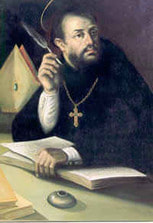

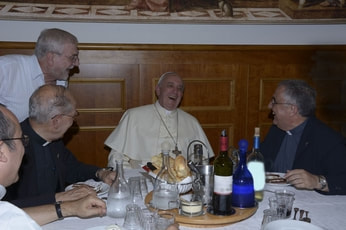

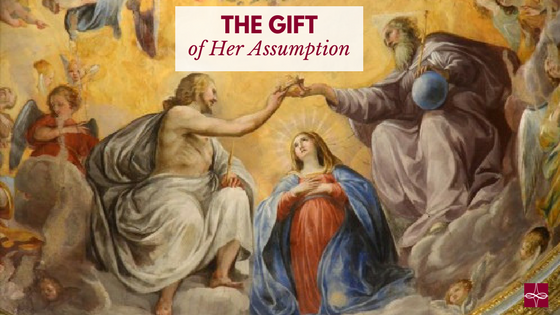


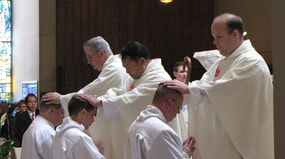
 RSS Feed
RSS Feed